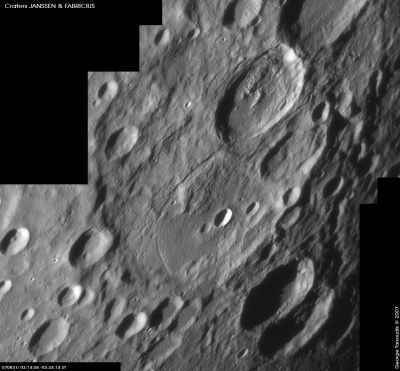Janssen
Contents
Janssen, with Rimae Janssen on its floor
|
Lat: 45.4°S, Long: 40.3°E, Diam: 199 km, Depth: 2.74 km, Rükl: 67, pre-Nectarian |

George Tasroudis Janssen is the large depressed area filling most of the image, with Fabricius on its upper right floor (and Metius partially visible beyond that). The two shadowed craters at lower right are Steinheil and Watt. The curved rille arcing like a tail out of Fabricius is part of Rimae Janssen.
Images
LPOD Photo Gallery Lunar Orbiter Images
Maps
(LAC zone 114D3) LAC map Geologic map
Description
Description: Elger
(IAU Directions) JANSSEN.--An immense irregular enclosure, reminding one of the very similar area, bordered by Walther, Lexell, Hell, &c., in the third quadrant. It extends about 150 miles from W. to E., and more than 100 from N. to S., its limits on the N. being rather indefinite. Its very rugged humpy surface includes one great central mountain, and innumerable minor hills and ridges, craters, and crater-pits; but the principal feature is the magnificent curved rill-valley running from the S. side of Fabricius across the rough expanse to the S. side. This fine object, very coarse on the N., passes the central mountain on the W. side, and becomes gradually narrower as it approaches the border; before reaching which, another finer cleft branches from it on the E., and also runs to the S. side of the plain.
Description: Wikipedia
Additional Information
- Depth data from Kurt Fisher database
- Westfall, 2000: 2.74 km
- Satellite crater Janssen K is radar bright at 70 cm.
- Satellite craters Janssen H and K are on the ALPO list of bright ray craters.
- Included on the ALPO list of banded craters
Nomenclature
- Named for Pierre Jules César Janssen (February 22, 1824 – December 23, 1907), a French astronomer who in 1868 discovered how to observe solar prominences without an eclipse.
- This feature was Catalog number 4483 in Mary Blagg's Collated List. The name was noted in Neison, 1876, where it is attributed to Birt. Beer and Mädler did not name the feature, and Julius Schmidt called it (or at least a portion of it) Argelander, a designation he says he had used since 1854, including on Lohrmann's charts.
- Neison's use of the name Janssen for the present feature was adopted by the IAU in Named Lunar Formations.
- Not to be confused with Jansen.
LPOD Articles
Black and Wispy.
Janssen
Highland Rilles
Crateric Concatenation
Some New Features
Greek Theater Mask
A Rim?
Kaguya Moon (Janssen Peak).
Bibliography
Harold Hill. A Portfolio of Lunar Drawings, pages 230, 231.